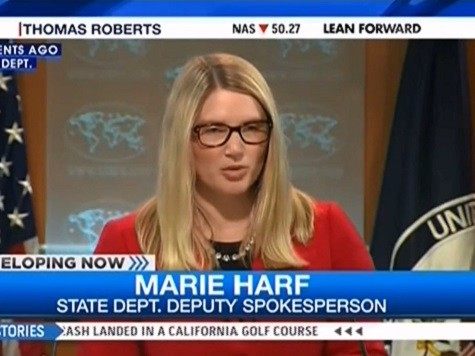Last week, legendary former Secretaries of State Henry Kissinger and George P. Shultz wrote a scathing Wall Street Journal op-ed critical of the Obama Administration’s nuclear dealmaking with Iran. The Obama State Department has responded, not with criticisms of the detailed argument in the piece, but by dismissing it as “a lot of big words and big thoughts.”
It was a very weighty piece, filled with serious criticism that even if Iran stops accusing Obama of lying about the deal and sticks with the framework presented by the Administration, the agreement still would not do much to slow down Iran’s nuclear ambitions, assuming its inspection provisions could even be enforced.
In one of the toughest passages of their article, Kissinger and Shultz point out that the inspections regime envisioned by the Lausanne framework is enormously complicated, based on vague criteria, and calls for manpower and technical resources the International Atomic Energy Agency probably does not have.
“In a large country with multiple facilities and ample experience in nuclear concealment, violations will be inherently difficult to detect,” wrote the former Secretaries of State. “Devising theoretical models of inspection is one thing. Enforcing compliance, week after week, despite competing international crises and domestic distractions, is another. Any report of a violation is likely to prompt debate over its significance—or even calls for new talks with Tehran to explore the issue. The experience of Iran’s work on a heavy-water reactor during the “interim agreement” period–when suspect activity was identified but played down in the interest of a positive negotiating atmosphere–is not encouraging.”
State Department Spokeswoman Marie Harf, already the subject of much humor for her unserious demeanor and suggestions such as combating the threat of ISIS with a jobs program for young jihadis, responded to this op-ed by dismissing it as “a lot of big words and big thoughts.”
Columnist David Brooks of the New York Times called this “the lamest rebuttal of a piece by two senior and very well-respected foreign policy people as I’ve heard” on the Hugh Hewitt radio show. “Are we in nursery school? We’re not, no polysyllabic words?”Brooks asked.
William M. Todd, an old family friend of Harf’s, linked to an article describing Harf’s performance and Brooks’ criticism on Facebook, crowing “Team Obama bans polysyllabic words!” Harf ended up in an angry Facebook exchange with Todd. “I’m not sure how you could think this article accurately portrays me or how I view complicated foreign policy issues, given how long you’ve personally known me and my family,” she wrote. “Does your hatred of this administration matter so much to you that it justifies posting a hurtful comment and a mean-spirited story about the daughter of someone you’ve known for years and used to call a friend?”
Other Facebook folk got into the discussion (including a victim of IRS targeting who asked if Harf had an official position on that) before Todd replied: “I certainly can understand why your Team would disagree with Henry Kissinger and George Schultz on policy matters. However, what is amazing to me was your condescending and, almost childish criticism of what I considered to be a well-reasoned and thoughtful op-ed on the current Middle East crisis.”
Todd told Harf that, given his relationship with her family, he did not like writing something critical of her personally, but the fact that he felt compelled to do so should “tell you how disappointed about the Department’s response to this op-ed” he was.
What Harf seems to be missing in all of this, and throughout many of her appearances on behalf of the State Department, is that spokespeople are responsible for delivering both factual content and setting the tone of the Department’s responses. She comes off as a lightweight, and so does her entire Department, which did not give her much room to drop a sound bite as absurd and shallow as complaining about the big words Henry Kissinger and George Shultz used. (And how is complaining that they had “big ideas” a criticism of their piece?)
Kissinger and Shultz caught Team Obama flatfooted, at a moment when the Iranians are taking great delight in ripping that Lausanne framework to pieces, throwing the pieces in Obama’s face, and daring him to walk away. If this Administration cannot respond to such a critique from elder American statesmen with equal gravity, how are they going to handle the mad mullahs of Iran?

COMMENTS
Please let us know if you're having issues with commenting.